Introduction to Behavioral Approaches in Addiction Treatment
Behavioral therapy has emerged as a cornerstone in contemporary addiction treatment. With a focus on modifying maladaptive behaviors, enhancing coping skills, and fostering sustainable change, these therapies serve both as primary interventions and as adjuncts to pharmacological approaches. Evidence from numerous studies underscores the efficacy of behavioral therapies such as cognitive-behavioral therapy (CBT), contingency management, and dialectical behavior therapy (DBT), especially in supporting individuals to reduce or eliminate dependence on medications in managing substance use disorders (SUDs). This comprehensive overview explores how behavioral therapies function within treatment plans, their proven outcomes, and innovative methods that bolster medication independence.
The Role of Behavioral Therapy in Addiction Treatment
Overview of behavioral therapy components
Behavioral therapy encompasses a range of strategies designed to modify problematic behaviors and thought patterns associated with substance use. Core elements include functional analysis, which identifies triggers and antecedents of drug-seeking behavior; cognitive restructuring, aimed at challenging and changing maladaptive thoughts; skills training, which equips individuals with coping mechanisms to handle high-risk situations; and contingency management, which reinforces positive behaviors through rewards.
These approaches work together to help individuals recognize and avoid triggers, develop healthier responses, and sustain abstinence. Techniques such as homework assignments and exposure therapy are often employed to practice these skills in real-life settings, ensuring the transfer of learned behaviors outside the clinical environment.
Addressing psychological factors underlying dependence
Behavioral therapy effectively targets the underlying psychological aspects of addiction, such as cravings, emotional trauma, and maladaptive beliefs. Cognitive-behavioral therapy (CBT), in particular, emphasizes understanding the relationship between thoughts, feelings, and behaviors that contribute to substance use.
Interventions like Motivational Interviewing enhance intrinsic motivation to change by resolving ambivalence, while Dialectical Behavior Therapy (DBT) teaches emotional regulation and distress tolerance, crucial for individuals with co-occurring mental health issues. Family and couples therapies further strengthen support networks, which are vital for long-term recovery.
These therapies aim to modify cognitive barriers to change, reduce emotional distress, and develop resilience, thereby addressing the psychological roots of dependence.
Supporting medication independence and relapse prevention
Behavioral therapies play a critical role in helping individuals achieve medication independence by fostering skills that support sustained abstinence. Techniques such as relapse prevention involve identifying high-risk situations and implementing coping strategies to manage cravings and prevent relapse.
Contingency management provides incentives that reinforce abstinence, increasing motivation and engagement. Digital innovations, including computer-assisted treatments and internet-based CBT, expand access and provide ongoing support outside traditional sessions.
Research indicates that combining behavioral therapies with medication enhances outcomes, but in some cases, effective behavioral therapy alone can support recovery, reducing reliance on pharmacological aid. Ultimately, these approaches help clients develop self-efficacy and resilience, enabling them to maintain long-term recovery without continuous medication dependence.
Therapeutic Techniques and Strategies for Reducing Medication Use
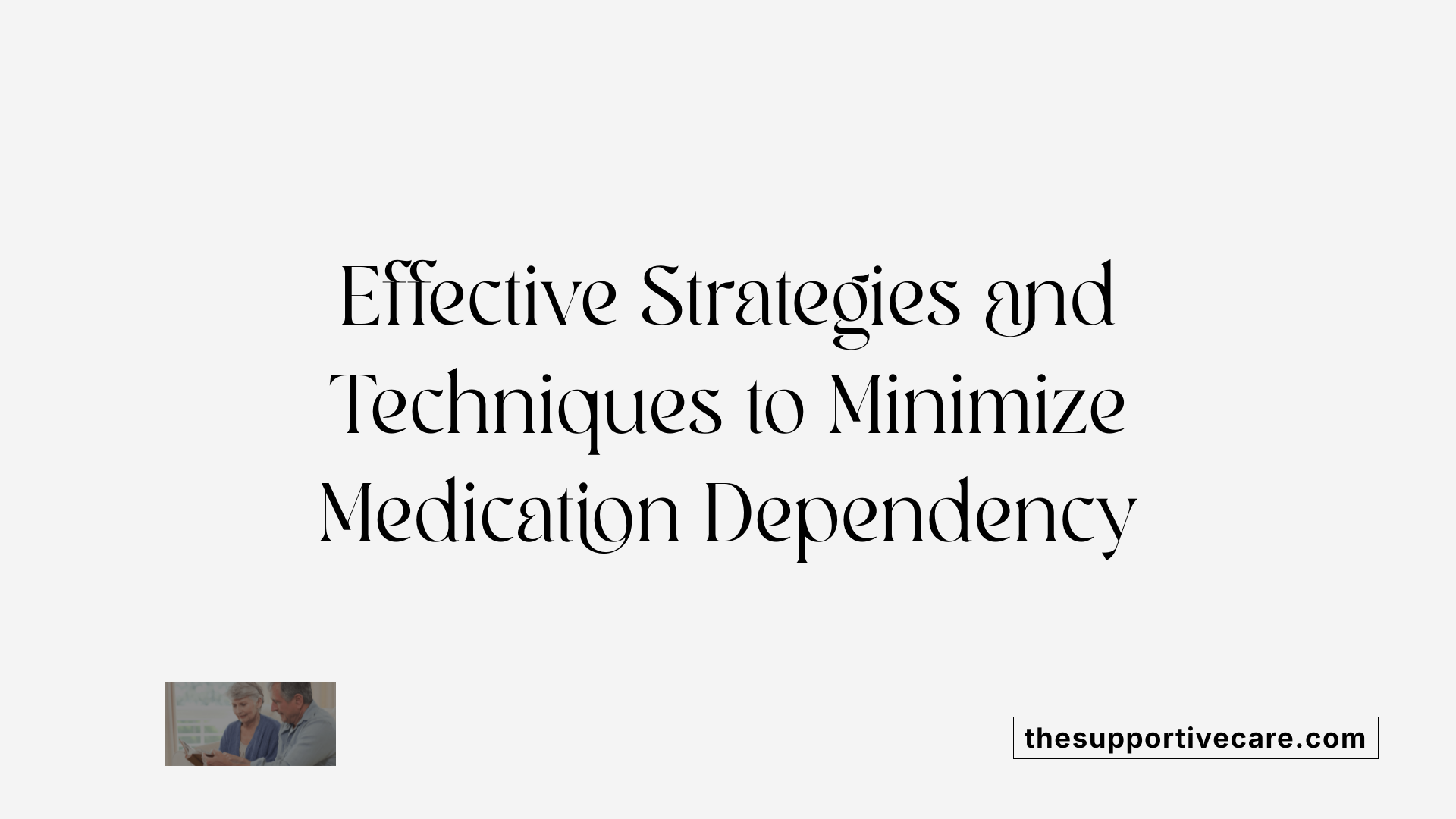
What strategies and methods within behavioral therapies help minimize medication use during addiction recovery?
Behavioral therapies offer various methods that help reduce dependence on medication by strengthening individuals' coping skills and promoting autonomous recovery. Cognitive-behavioral therapy (CBT), for example, emphasizes skill development such as cognitive restructuring and relapse prevention planning, which address maladaptive thoughts and behavior patterns.
Motivational strategies, including motivational interviewing (MI), focus on enhancing the person's internal motivation to change, which can motivate individuals to rely less on pharmacological aids. Contingency management (CM), on the other hand, utilizes positive reinforcement, providing tangible rewards for maintaining abstinence or meeting behavioral goals, thereby reinforcing drug-free behaviors.
Early intervention approaches, like screening and brief interventions, serve as preventive measures to address substance use early, reducing the likelihood of severity that would necessitate medication. Education on neurobiological aspects of addiction incorporated into therapy can boost motivation and diminish stigma, encouraging more engagement with behavioral methods.
Tailoring interventions to individual development stages and neurobiological profiles supports more targeted, medication-sparing pathways. Additionally, modern approaches such as integrating technology—like computer-assisted therapy—and community reinforcement programs increase engagement and support sustained behavioral change.
By focusing on skill building, reinforcement, and motivation, these strategies aim to create a durable recovery foundation that minimizes the need for ongoing medication, aligning with a holistic and empowering approach to addiction treatment.
Evidence Supporting Behavioral Therapy for Medication Reduction
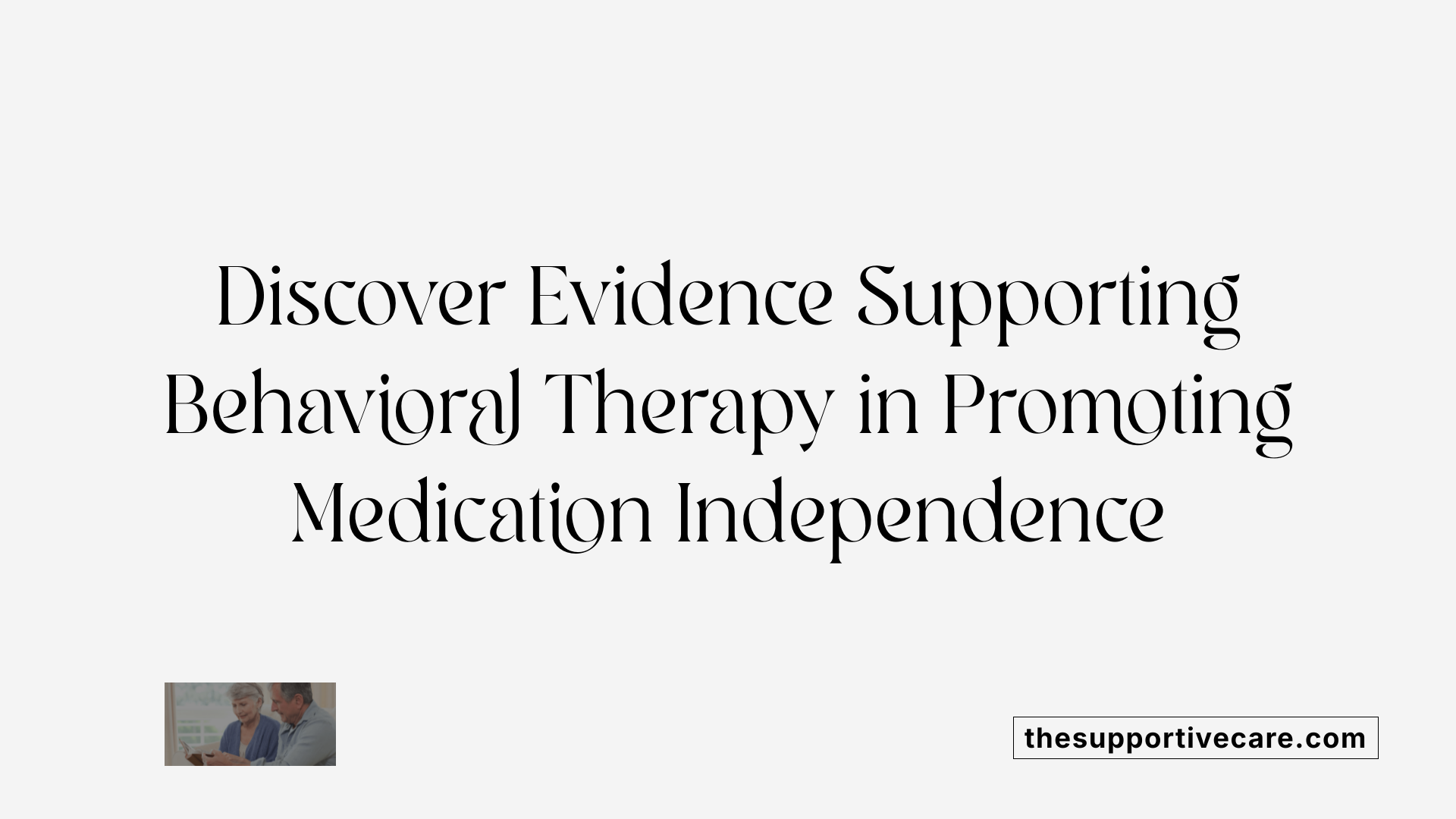
What is the role of behavioral therapy in comprehensive addiction treatment plans to promote medication independence?
Behavioral therapy is a fundamental component of holistic addiction treatment, focusing on addressing the psychological, emotional, and behavioral factors that contribute to substance dependence. It aims to help individuals develop coping skills, boost self-efficacy, and strengthen motivation for sustained change.
Among the most well-validated approaches is cognitive-behavioral therapy (CBT), which actively works to identify and modify maladaptive thoughts and behaviors related to drug use. When combined with pharmacotherapy, CBT can significantly enhance the chances of achieving medication independence.
Research shows that behavioral interventions reinforce positive behavioral patterns, improve emotional regulation, and foster greater treatment engagement. These elements are crucial for reducing reliance on medications and maintaining long-term recovery.
Innovations such as internet-based CBT programs extend access, especially in underserved areas, making these effective approaches even more accessible. Integrating behavioral therapy within treatment plans not only supports immediate reduction in medication use but also equips individuals with essential skills for relapse prevention and sustained abstinence.
Evidence from meta-analyses and controlled trials underscores that a combination of behavioral strategies and medication results in better outcomes, promoting medication independence and improving quality of life for those struggling with addiction.
Comparing Behavioral Therapies and Pharmacological Approaches
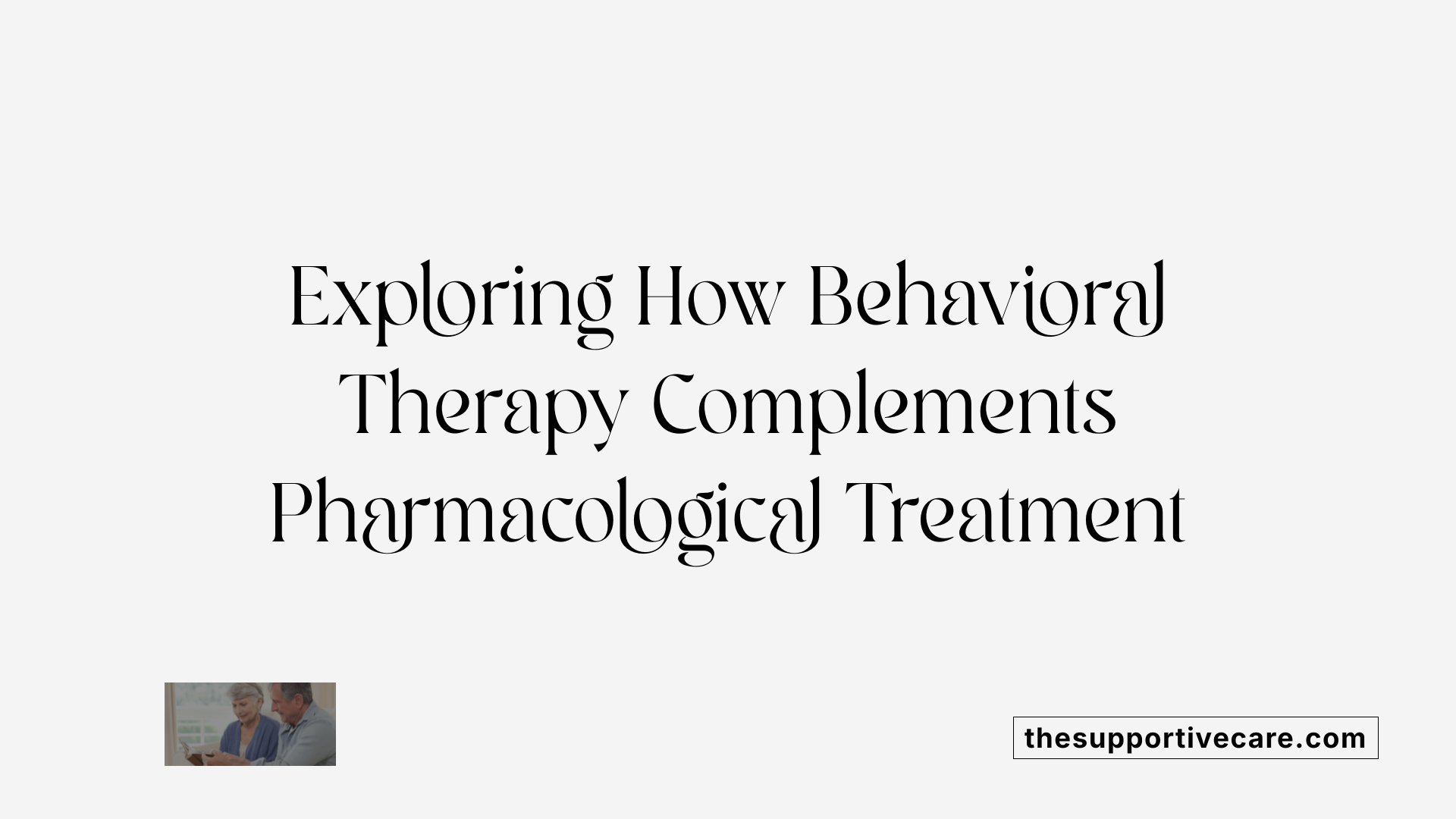
How does behavioral therapy help in reducing medication dependency in addiction treatment?
Behavioral therapy, especially cognitive-behavioral therapy (CBT), is a vital component in addressing medication dependency. It helps individuals identify and change negative thought patterns and behaviors linked to substance use. Through techniques such as cognitive restructuring, skills training, and relapse prevention strategies, CBT targets the psychological triggers that often lead to cravings and relapse.
By developing healthy coping skills and increasing self-awareness, patients become better equipped to manage their urges independently. Evidence from numerous clinical studies and systematic reviews shows that CBT improves behavior management and stress coping, often leading to sustained recovery.
While medications such as buprenorphine or naltrexone help stabilize brain chemistry and reduce physical dependence, behavioral therapies reinforce psychological resilience. Combining these approaches can produce synergistic benefits, but in some cases, CBT alone is effective for maintaining long-term abstinence.
Ultimately, behavioral therapy helps foster sustainable change, empowering individuals to sustain recovery without relying heavily on medication, thereby reducing overall medication dependency.
Innovative and Emerging Strategies in Behavioral Therapy
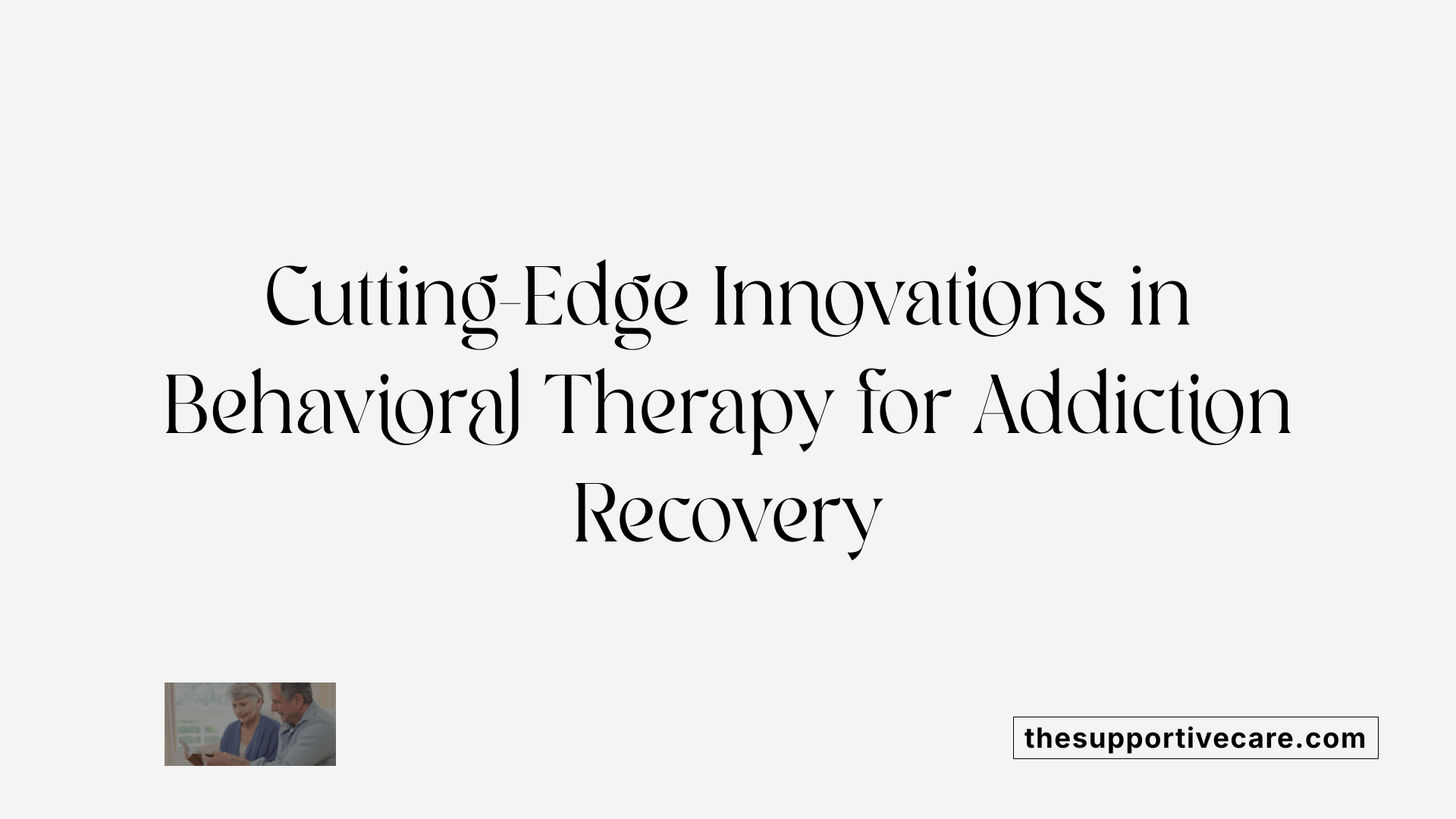
What novel strategies are being developed to enhance behavioral therapy effectiveness for medication reduction?
Recent advances in behavioral therapy focus on integrating technology and neuroscience to improve treatment outcomes and reduce reliance on medication among individuals with substance use disorders.
One promising approach involves computer-assisted treatment (CAT), which uses digital platforms to deliver therapy modules, monitor progress, and provide personalized feedback. This technology increases accessibility, especially for populations in remote or underserved areas, and allows for more flexible scheduling. Digital interventions can also support ongoing engagement, helping individuals stay motivated and adhere to their recovery plans.
Another innovative strategy is the use of pharmacological augmentation, such as the drug D-cycloserine, which enhances the effects of behavioral therapy by facilitating learning processes related to extinction of drug cravings and maladaptive behaviors.
Moreover, neuroscience-informed methods are being developed to target specific brain pathways involved in addiction. These approaches utilize brain imaging and neurobiological insights to tailor interventions that directly modulate neural circuits responsible for craving, impulsivity, and compulsive drug-seeking behaviors.
Overall, these emerging strategies aim to make behavioral therapies more effective, personalized, and accessible. They support efforts to decrease medication dependence by strengthening the internal mechanisms for change, thus fostering long-term recovery.
| Strategy Type | Description | Benefits |
|---|---|---|
| Digital Platforms (CAT) | Use of internet and app-based programs for therapy | Expands reach, improves flexibility, supports continuous engagement |
| Pharmacological Augmentation | Combining medications like D-cycloserine with therapy | Enhances learning and extinction of addictive behaviors |
| Neuroscience-Informed Approaches | Tailoring interventions based on brain activity analysis | Increases treatment precision, targets neural pathways involved in addiction |
These innovations are driving the future of addiction treatment, offering more personalized and effective options to support medication reduction and sustained recovery.
Benefits and Long-term Outcomes of Behavioral Therapy Integration
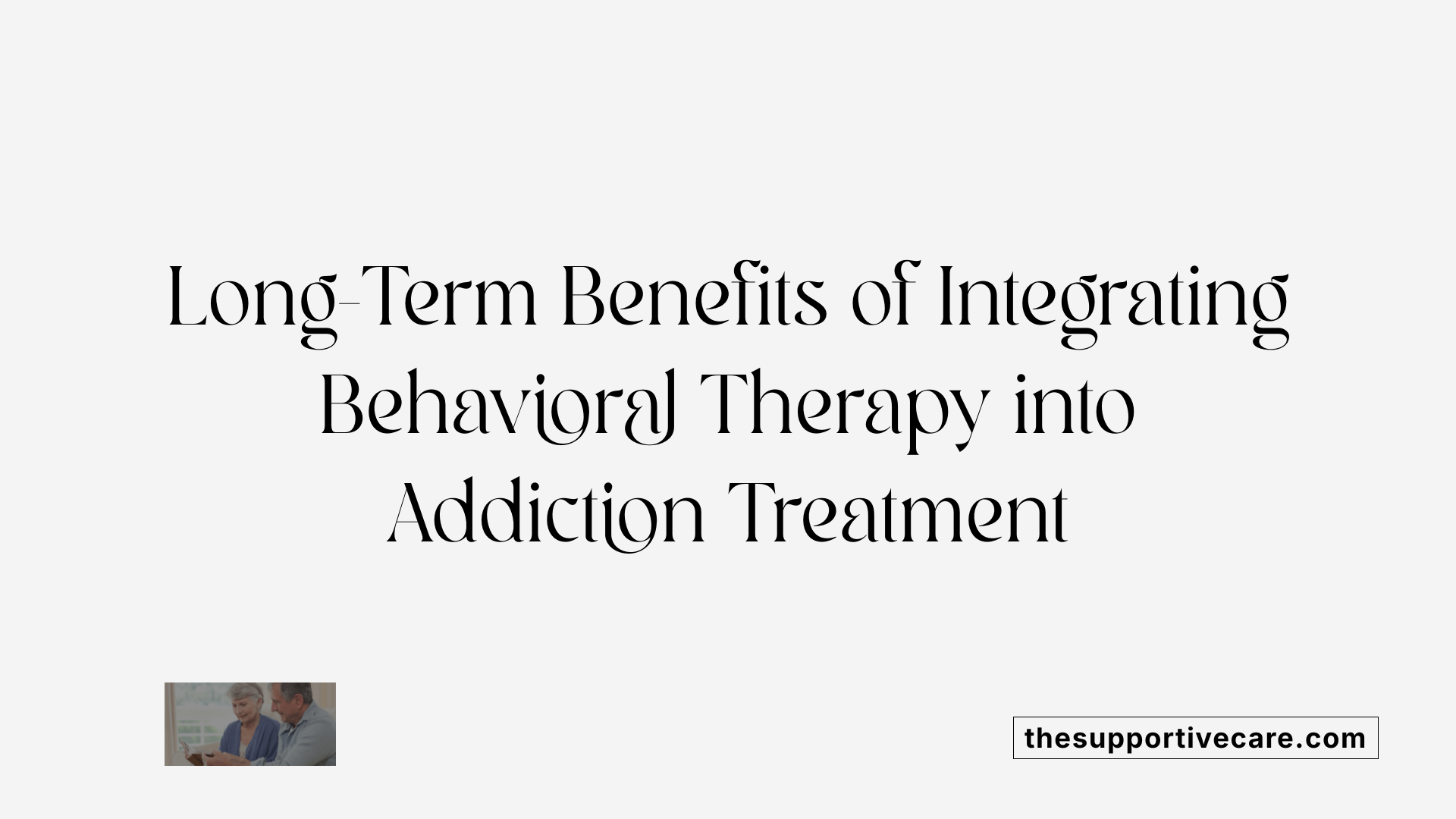
What are the benefits and outcomes of integrating behavioral therapy into addiction recovery programs focused on reducing medication dependence?
Integrating behavioral therapy into addiction recovery offers many advantages, especially in reducing medication reliance and supporting lasting recovery. These therapies help patients develop strong coping strategies, which are vital for preventing relapse. Evidence from numerous clinical trials shows that approaches like cognitive-behavioral therapy (CBT), contingency management, and family or couples therapy effectively decrease substance use and promote sustained abstinence.
When combined with medication management, behavioral therapies also improve mental health outcomes by addressing co-occurring conditions such as depression and anxiety. This combined approach leads to fewer hospitalizations, improved social relationships, and an overall better quality of life. Treatment programs that involve multidisciplinary teams, personalized care plans, and ongoing progress monitoring tend to be more successful.
Importantly, behavioral therapies help modify problematic habits and behavioral patterns, which can lessen the need for ongoing medication, making recovery more sustainable. Such an integrated system fosters healthier lifestyles, encourages social reintegration, and ultimately supports individuals in maintaining their sobriety without excessive medication dependence.
Final Thoughts on Behavioral Therapy and Medication Independence
Behavioral therapy remains a powerful, evidence-based cornerstone in the quest to reduce medication dependency among individuals struggling with substance use disorders. Its capacity to modify deep-seated behavioral and psychological patterns, bolster coping skills, and sustain long-term abstinence makes it indispensable in comprehensive addiction treatment plans. Continuous innovations—including digital interventions and neuroscience-inspired methods—are expanding the reach and efficacy of behavioral therapies. When integrated thoughtfully with medication management, these approaches are fostering a shift towards more sustainable, medication-free recovery pathways. The ongoing research and clinical advancements underscore the importance of personalized, multidisciplinary strategies in achieving lasting change and improving quality of life for those in recovery.
References
- Cognitive-Behavioral Therapy for Substance Use Disorders - PMC
- National Helpline for Mental Health, Drug, Alcohol Issues - SAMHSA
- Treatment and Recovery | National Institute on Drug Abuse (NIDA)
- Combined Pharmacotherapy and Cognitive Behavioral Therapy for ...
- Behavioral Therapies for Drug Abuse | American Journal of Psychiatry
- Addiction Treatment Methods | Evidence-Based Practices
- Substance Use Disorder (SUD): Symptoms & Treatment
- Cognitive Behavioral Therapy - Fifth Avenue Psychiatry
- Medications for Substance Use Disorders - SAMHSA
- Cognitive Behavioral Therapy for Addiction: Techniques



































































































